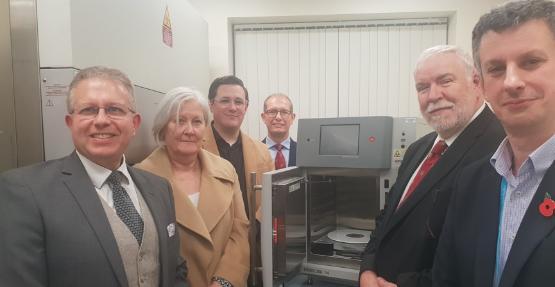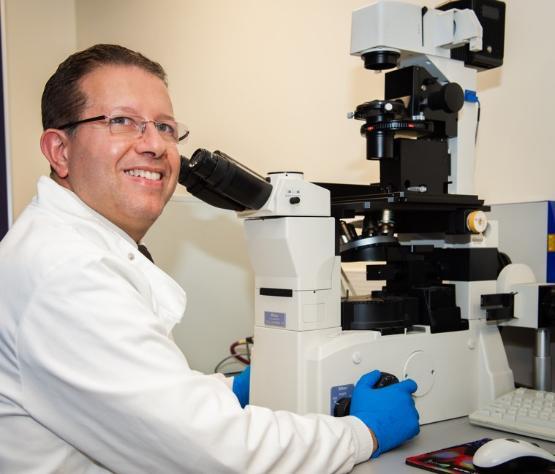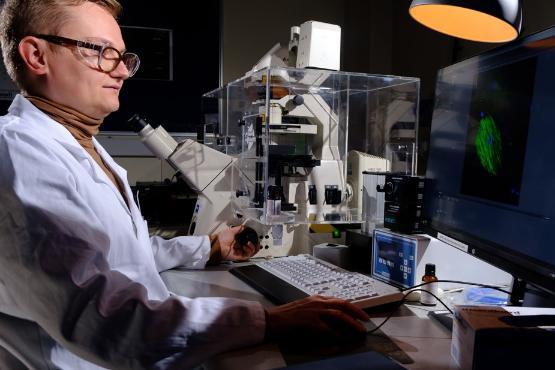Donors help fund cutting-edge ‘radiation source’ to help develop cancer cures
Cutting-edge cancer cures will be developed much faster at the University of Bradford thanks to a new £72,450 Precision X-Ray Radiation Source System.

The Precision X-Ray CellRad+ Irradiation System was purchased thanks to a series of charitable donations from West Riding Masonic Charities Ltd, former Head of Business Engagement at the school of Management and alumnus Lorraine Lucas, The Charles and Elsie Sykes Trust, In Sue’s Name, The George A Moore Foundation, The Hospital Saturday Fund, the Modiano family, and others who wished to remain anonymous.
ICT Director Professor Robert Falconer said: “The University would like to thank everyone who has donated money to make it possible for us to purchase this piece of equipment. It will transform our research and enable us to embark on a range of exciting new projects leading to anti-cancer treatments.”
The Precision X-Ray CellRad+ Irradiation System will be housed in the University’s Institute of Cancer Therapeutics (ICT) and will greatly enhance the capacity of ICT to develop therapeutics tailored to an individual’s genetic make-up. This could result in increased life expectancy, faster recoveries, reduced side effects and overall improved quality of life for patients.
This new facility at Bradford strengthens our commitment to improving patient outcomes and reflects our mission to lead transformative cancer research that benefits patients globally.
The impact of the radiation source will be felt through ICT’s development of ground-breaking new ‘pro-drugs’ that can effectively destroy cancerous cells with minimal side effects and help extend patients’ lives.
The equipment will crucially allow the drugs to be tested in combination with radiation thus ensuring that the correct doses are delivered for specific types of tumours.

Professor Sherif El-Khamisy, Pro-Vice-Chancellor for Research and Innovation, pictured above, said: “As we open the radiation source at the Institute of Cancer Therapeutics, we are taking a powerful step forward in advancing cancer treatment. Radiotherapy, particularly in combination with chemotherapy, offers promising potential to target cancer cells with greater precision and efficacy. This new facility at Bradford strengthens our commitment to improving patient outcomes and reflects our mission to lead transformative cancer research that benefits patients globally.”
Duncan Kilbride, Chairman of West Riding Masonic Charities Ltd, said: “Freemasons and their families from around the county regularly contribute to our charity which enables us to provide support for organisations when they need it most. The battle to find new and better treatments for Cancer is so important and we’re delighted to help an organisation in West Yorkshire that is at the cutting edge of research.”
Lorraine Lucas said: “Having donated to the fund it was fantastic to see the machine and meet the staff and students who will be using it in their work. The tour of the centre was inspiring, seeing all the stages involved in developing treatments and the passion from all involved.”
Craig Rydqvist, Chair of Trustees at In Sue's Name, said: "In Sue's Name is honoured to be a donor for this important new radiation source to push forward the critical work taking place at the University of Bradford.
“We established In Sue's Name in 2017 to raise money for brain tumour research following the death of our founder's daughter, Sue Blasotta, from a brain tumour at the age of 43. So far, we have raised over £550,000 towards ground-breaking research into brain tumours by hosting events and undertaking charity challenges.
"Myself and our newest trustee, Kirsty Drury, are both alumni of the University of Bradford. When the University approached us looking for funding for the new radiation source, the charity's trustees wholeheartedly supported a donation and they were particularly keen on the potential for the new radiation source to aid understanding of glioblastomas, the specific type of brain tumour that had killed Sue.
“In Sue’s Name is proud of the donation we are making, and we look forward to building a strong partnership with the University of Bradford as it continues its important research in this area.”
How the Radiation Source will help
A key aspect of the ICT’s work involves testing the effects of treatments on cell samples from different types and stages of cancer. Radiation is one of the most common cancer therapeutics, with 27% of patients undergoing radiotherapy as part of their cancer treatment – often as part of a wider programme.
This method is therefore an important tool in the fight against cancer and forms an essential part of the ICT’s work to create effective combination therapies. Prior to purchasing the radiation source, ICT staff were reliant on external partners for access to equipment and laboratory facilities, delaying progression of potentially lifesaving therapeutics.
Round-the-clock access to a radiation source will greatly enhance the development of new treatments, ultimately leading to faster, more efficient, less toxic, and more personalised anticancer strategies. Using radiotherapy in combination with other treatments means that it can be delivered in lower and more specific doses according to the type of cancer and needs of the individual, thereby reducing side effects.

Global impact
The impact of purchasing this equipment will be felt on a global scale. Current treatments, which usually involve a combination of chemotherapy and radiotherapy, often result in a multitude of side effects which dramatically reduce quality of life. The ICT is developing ground-breaking new therapeutics for some of the most common forms of cancer, including breast, prostate, brain and lung. These ‘pro-drugs’ can effectively destroy cancerous cells with minimal side effects, thereby helping to transform long-term patient prognoses, but must be tested in combination with radiation to ensure that the correct doses are delivered for specific types of tumours. Purchasing a radiation source will therefore greatly help the ICT’s work in developing these innovative treatments.
The ICT’s expertise in fighting cancer
The ICT has a proven track record in developing innovative cancer treatments. For example, the Crocus Smart-Bomb, which is currently awaiting Phase 1 clinical trials, has been shown to target solid tumours whilst minimising damage to the rest of the body. Our researchers have also discovered an aspect of our DNA metabolism that could be manipulated to aid treatment for a range of life-limiting conditions including cancer and dementia. The ICT’s work will lead to better and more personalised therapeutics for patients worldwide, but research is being delayed by something as simple as not having the correct equipment.
If you have any questions or would like further information on the ICT’s work, please contact Philip Fisher on [email protected].
